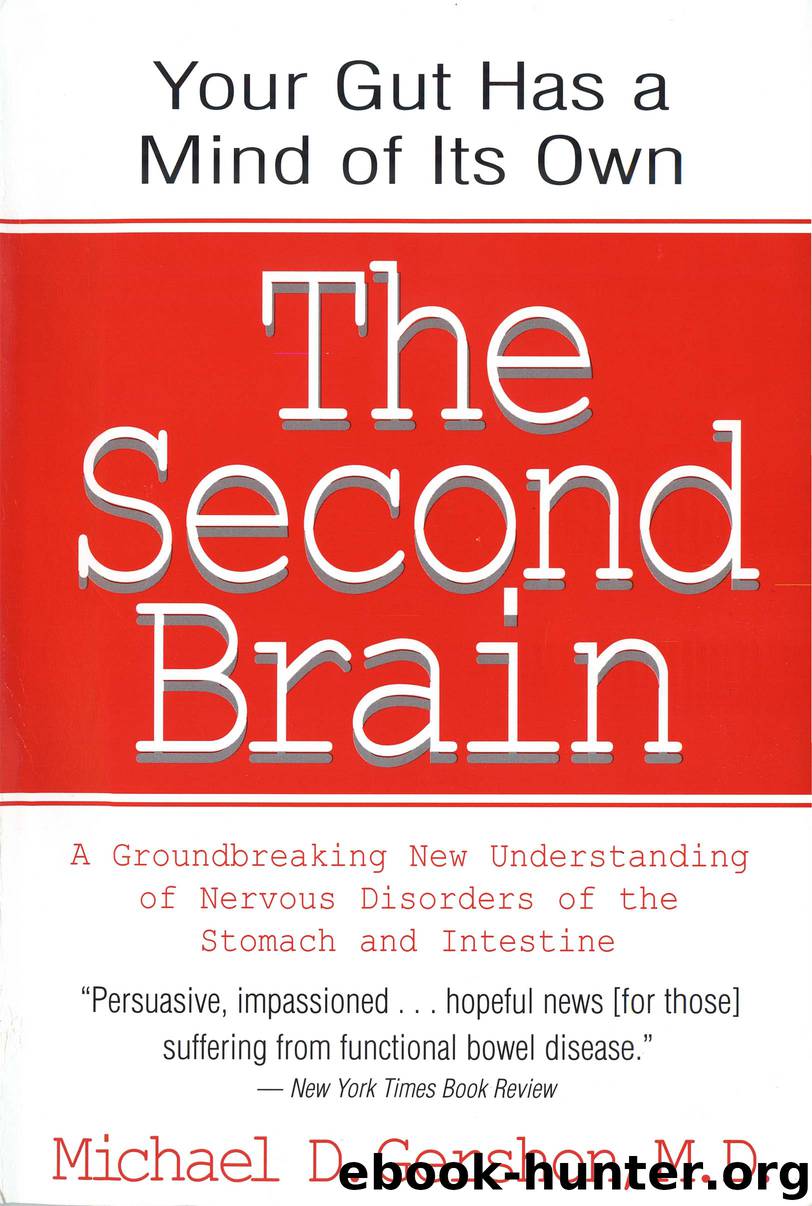The Second Brain by Michael Gershon

Author:Michael Gershon
Language: eng
Format: epub
Publisher: HarperCollins
Published: 2019-04-10T04:00:00+00:00
8
A Bad Bowel
THE TOP AND BOTTOM ends of the digestive system are regions where the brain in the head plays the critical role in determining what the bowel does. Input and output are centrally determined phenomena. These are also attention-grabbing activities that dominate a good part of a normal person’s existence. Some people live to eat, while others, who rarely admit it, get their tingle from defecation. Between ingestion and egestion, how-ever, a great many events occur in the bowel, which are ignored by the brain and left to be managed primarily by the enteric nervous system. Because the second brain thus works in obscurity, it is often overlooked as a source of disease.
The Gut Is Not Immune to Mental Disease
The behaviors that evolution has made the prime responsibility of the brain can clearly and obviously be influenced by psychopathology. We should expect, therefore, to find that the enteric functions that are most affected by the central nervous system are also those that are conscripted by the brain to participate in particular forms of mental illness. That there might be enteric symptoms of psychiatric illnesses, therefore, ought not to be a surprise to anyone. Eating disorders such as anorexia nervosa and bulimia are examples of conditions that are recognized as neurotic, or even psychotic, in origin. Similarly, certain personality disorders have for many years been associated with the effort devoted to learning to bring the external anal sphincter under socially acceptable control. The anal-retentive or obsessive personality has passed long ago from the annals of medicine into popular literature and common usage. People are thus accustomed to the belief that thought, conscious or otherwise, can affect behaviors that they associate with the gut. The notion that thinking can alter what goes on in the bowel leads easily and comfortably to the belief that neurotic or psychotic thoughts in the head can raise enteric havoc. Psychosomatic disease of the gut, therefore, is a concept that has never encountered much difficulty in gaining acceptance.
Personal experience is another factor that has enhanced the idea that the central nervous system can be the cause of intestinal malfunction. Butterflies in the belly and diarrhea, for example, are frequent accompaniments to anxiety. Some people are so used to the attendant music from their gut that if it were missing, they would not even know that they were anxious. The enteric consequences of strong emotions are thus not esoteric or theoretical concepts to most people but real problems of everyday life. The brain thus seems like an obvious perpetrator of intestinal grief. The psychosomatic origin of enteric illness is, as one of my former teachers of mathematics used to say after filling a blackboard with obscure equations, “intuitively obvious, even to the most casual observer.” Unfortunately, being intuitively obvious does not necessarily mean being correct. When behaviors of the bowel that are essentially under enteric control are disturbed, it is by no means clear that the output of the enteric nervous system is aberrant because the brain has made it so.
Download
This site does not store any files on its server. We only index and link to content provided by other sites. Please contact the content providers to delete copyright contents if any and email us, we'll remove relevant links or contents immediately.
Men In Love by Nancy Friday(5234)
Everything Happens for a Reason by Kate Bowler(4734)
The Immortal Life of Henrietta Lacks by Rebecca Skloot(4576)
Why We Sleep by Matthew Walker(4434)
The Sports Rules Book by Human Kinetics(4379)
Not a Diet Book by James Smith(3410)
The Emperor of All Maladies: A Biography of Cancer by Siddhartha Mukherjee(3148)
Sapiens and Homo Deus by Yuval Noah Harari(3066)
Day by Elie Wiesel(2780)
Angels in America by Tony Kushner(2652)
A Burst of Light by Audre Lorde(2597)
Endless Forms Most Beautiful by Sean B. Carroll(2473)
Hashimoto's Protocol by Izabella Wentz PharmD(2371)
Dirty Genes by Ben Lynch(2313)
Reservoir 13 by Jon McGregor(2300)
Wonder by R J Palacio(2203)
And the Band Played On by Randy Shilts(2197)
The Immune System Recovery Plan by Susan Blum(2057)
Stretching to Stay Young by Jessica Matthews(2036)
